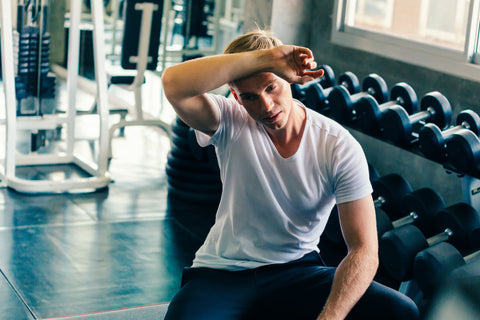If you’re serious about your workouts, there’s one nutrient you might be overlooking: Vitamin D. Often linked to bone health, vitamin D or the sunshine vitamin plays an essential role in muscle function and recovery - two things that directly impact how well you perform and how quickly you bounce back after tough sessions.
Unfortunately, over a billion people worldwide are either deficient or insufficient in vitamin D, especially those who spend most of their time indoors. Even if your workout routine and supplement plan are well-structured, missing out on this key nutrient can negatively impact your health and reduce your performance in the gym.
In the following post, let’s look at how adding vitamin D to your fitness regime can boost performance, speed recovery, and support overall health.
Improved Muscle Function

Vitamin D supports muscle function by improving the efficiency of muscle contractions. It helps regulate the absorption of calcium and phosphorus, both of which are necessary for proper muscle contractions and nerve function. With sufficient vitamin D, your muscles can contract and relax, leading to better control, strength, and endurance during workouts.
This nutrient also supports muscle repair, ensuring your muscles recover and rebuild stronger after intense sessions. Without enough vitamin D, you might experience muscle weakness, cramps, or slower recovery times, making it harder to progress in your training. By maintaining optimal vitamin D levels, your muscles can function at their best, helping you lift heavier, train longer, and avoid injuries.
Boost in Immunity
Vitamin D strengthens your immune system. For gym-goers, this is especially important, as intense workouts can sometimes lower immunity and leave you more vulnerable to getting sick. Vitamin D helps regulate the immune response, allowing your body to fight off infections more effectively and recover faster from illnesses.
This nutrient also helps reduce inflammation and encourages faster healing, which is especially important for those training regularly. A strong immune system means fewer missed workouts due to sickness, allowing you to stay consistent and focused on your fitness goals.
Enhanced Bone Health
Intense weightlifting, running, and other high-impact activities can take a toll on your bones over time. Without adequate vitamin D, bones can become weaker and more prone to injuries.
However, vitamin D helps your body absorb calcium which supports bone growth and strength. It ensures that the calcium you consume is effectively used to maintain bone density and resilience, reducing the risk of fractures and bone-related injuries.
Improved Mental Health and Mood
Regular exercise helps improve mental health and mood, but vitamin D can take that a step further. Low vitamin D levels are associated with increased symptoms of depression and anxiety, which can affect your motivation and consistency in the gym.
However, regular vitamin D intake regulates serotonin levels, which influence mood and feelings of well-being. Maintaining vitamin D levels can stabilise mood fluctuations, stay motivated, and remain consistent in your fitness journey.
Enhanced Energy Levels
Deficiency in vitamin D can lead to fatigue and reduced stamina during workouts. This is because vitamin D is necessary to support the energy-producing processes in cells, specifically within the mitochondria.
When vitamin D levels are low, the body may struggle to maintain the energy needed for prolonged physical activity, causing fatigue more quickly. Ensuring adequate vitamin D intake can help improve your energy levels, allowing for longer, more intense training sessions and better overall workout performance.
Better Cardiovascular Health
For fitness enthusiasts who regularly engage in activities like running, cycling, or high-intensity interval training (HIIT), a strong cardiovascular system is essential. Lack of vitamin D can weaken heart function and increase the risk of hypertension, leading to reduced endurance and stamina during exercise.
Vitamin D supports the function of blood vessels, helping them remain flexible, which ensures smooth blood flow throughout the body. Adequate vitamin D levels reduce strain during physical exertion and promote cardiovascular efficiency.
Reduced Muscle Inflammation
One lesser-known benefit of vitamin D is its ability to reduce muscle inflammation after intense workouts. Exercise, particularly strength training, causes micro-tears in muscle fibres, leading to inflammation as the body repairs itself. Vitamin D helps regulate the body’s inflammatory response, reducing excessive inflammation and soreness.
This can lead to faster recovery times and less post-workout discomfort, allowing you to maintain a more consistent training schedule without extended downtime.
How to Get Enough Vitamin D?
The three main sources of Vitamin D include:
Sunlight
Spending time outdoors in direct sunlight is the most natural way to boost vitamin D levels. Just 10-30 minutes of midday sun exposure several times a week can help most people meet their vitamin D needs.
However, geographic location, skin type, and sunscreen use can affect how much vitamin D you absorb from sunlight.
Diet
While sunlight is the primary source of Vitamin D, certain foods can also help you meet your daily requirements. Here's a list of vitamin D-rich foods to include in your diet:
- Fatty fish (such as salmon, mackerel, and sardines)
- Egg yolks
- Fortified milk and plant-based alternatives (soy, almond, and oat milk)
- Fortified cereals
- Fortified orange juice
- Cheese
- Cod liver oil
- Beef liver
- Mushrooms (especially those exposed to sunlight or UV light)
- Fortified tofu
- Shrimp
Supplements
Supplements are often recommended for people unable to meet their daily vitamin D requirements through sunlight and diet alone. Supplements are available in various forms, including tablets, soft gels, and liquid drops. They can easily be incorporated into your daily routine.
Generally, the daily intake for adults is around 600-800 IU. However, the dosage can vary based on age, gender, and health needs. If you are looking to use supplements to boost vitamin D levels, it is best to consult with a healthcare provider to determine the optimal dosage.
Boost Your Vitamin D with Fenix Active Supplements
Fenix Active offers premium-quality vitamin D supplements to support the fitness and health goals of those struggling to meet their daily vitamin D requirements. Our supplements are formulated to help enhance muscle function, speed recovery, and improve overall well-being.
Take control of your health today—choose Fenix Active for your vitamin D boost and feel the difference. Visit our vitamin shop and explore our curated selection.
FAQs
Is vitamin D good for bodybuilders?
Yes, vitamin D is beneficial for bodybuilders as it supports muscle strength, enhances recovery, and aids in muscle contractions. It also helps reduce inflammation after intense workouts.
How much vitamin D for the gym?
For gym-goers, the recommended daily intake is typically 600-800 IU, but higher doses may be needed for those with deficiencies. It's best to consult a healthcare provider for personalised advice.
Do people who exercise need more vitamin D?
People who exercise may need more vitamin D, especially if they train intensely or have limited sun exposure. Higher levels can help with recovery, muscle function, and immune support.
Can too much vitamin D affect muscles?
Excessive vitamin D can lead to muscle weakness and cramps due to elevated calcium levels in the blood. To avoid negative effects, it's important to stick to recommended doses.
Which exercise is best for naturally boosting vitamin D?
Outdoor exercises like running, walking, or cycling are best for boosting vitamin D, as they expose you to sunlight, which helps your body produce the vitamin naturally.



